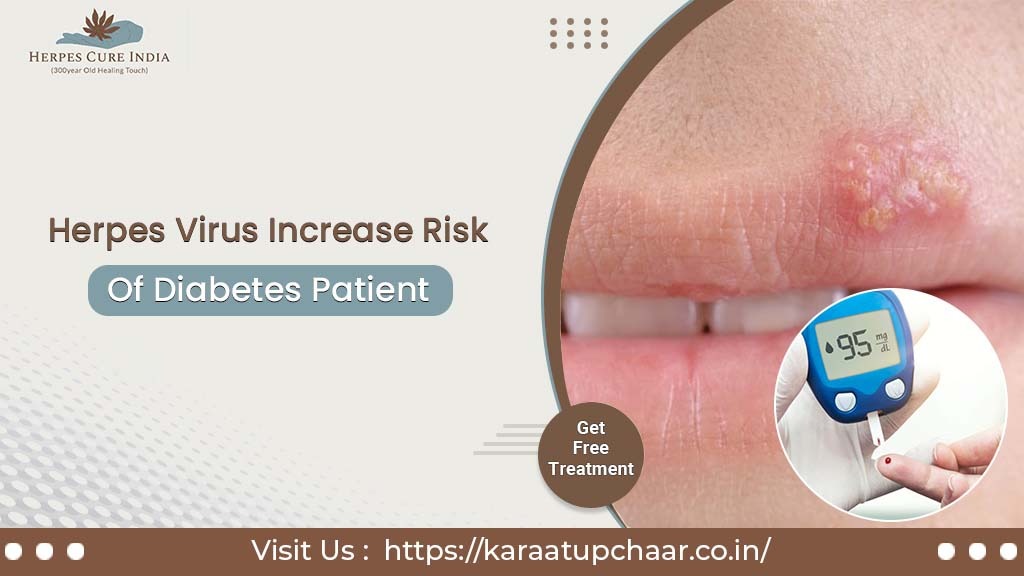
Herpes Virus Infection Increases the Risk for Diabetes Patients
Herpes virus infection is caused by the reactivation of varicella-zoster virus (VZV) dormant in the sensory ganglia following primary infection. This results in a painful blister or rash on the affected area as the virus travels along sensory nerve fibers. The annual incidence of herpes virus is similar in the Asia Pacific, North America, and Europe, at 3 to 5 cases per 1000 person-years (PY). The incidence of herpes viruses increases markedly with age and immunosuppression, affecting more than 50% of people over the age of 85.
Diabetic patients are susceptible to herpes virus infection due to decreased cell-mediated immunity (CMI) during this process and the reactivation of the varicella-zoster virus. Diabetes mellitus (DM) is generally recognized as a prothrombotic disease associated with altered innate or adaptive immunity and endothelial dysfunction secondary to inflammation. Therefore, diabetes mellitus with chronic comorbidities or associated vascular complications is considered a major preventable risk factor for cardiovascular disease. Diabetic patients are two to four times more likely to develop cardiovascular or cerebrovascular disease than non-diabetic patients. Patients are at increased risk of developing the herpes virus if they have two or more comorbidities. On the other hand, herpes zoster is an independent risk factor for VZV vascular lesions such as stroke, transient ischemic attack, and myocardial infarction. However, few studies have examined the association between shingles risk and diabetes-related microvascular disease in diabetic patients with coronary artery disease (CAD).
The aim of this study was to determine whether the risk of herpes zoster in diabetic patients increases with the co-occurrence of coronary artery disease or with other associated microvascular diseases. In addition, we assessed the effect of anti-diabetic drugs on the risk of herpes viruses in these patients using data from a national database in Taiwan.
Herpes Virus Infection Triggers Diabetes Patients
A common herpes virus can trigger diabetes in people with diabetes. People infected with herpes simplex virus type 1 (HSV-1) may have a 50% increased risk of developing type 2 diabetes. Previous research has shown that hepatitis C virus infection is a risk factor for type 2 diabetes. However, it is also possible that infection with other viruses can make people more susceptible to the disease.
The current study tested HSV-1 infection in 206 participants with type 2 diabetes and a control group of 1,360 participants without diabetes. All participants were negative for antibodies to the hepatitis C virus, the researchers found. The findings showed that 46 percent of the diabetic patients were infected with HSV-1, compared with 36 percent of the control group. In a Diabetes Care (February 2005) report, researchers showed that people with diabetes accounted for 16 percent of the HSV-1-infected population, but only 11 percent of the non-diabetic group were free of the virus.
Why Diabetes Makes It Easy to Contract Herpes Virus Infection
Most people with type 1 or type 2 diabetes have a weakened immune system, making it easier to get infections and harder to fight them off. Because of this, people with diabetes are more susceptible to viral infections, including herpes simplex virus (HSV). HSV is one of the most common and easily contracted STDs, and people with diabetes can contract HSV if they are not careful with someone who is already infected.
Herpes and Type 1 Diabetes
The herpes virus remains in the body’s nerve cells indefinitely, regardless of whether the person has frequent or infrequent attacks. While these can be triggered by lifestyle changes (e.g., stress, menstruation), having a compromised immune system in diabetics puts them at constant risk of flare-ups.
How to Prevent Herpes Virus Infection in Diabetic Patients
The best protection against HSV in people with type 1 and type 2 diabetes is prevention. While a weakened immune system can make it easier to catch the virus, there are steps you can take to avoid it. The Centers for Disease Control and Prevention recommends avoiding specific contact with infected people as a best precaution, including:
– Having vaginal, anal, or oral sex
– Kissing
– Sharing drinks or cutlery
If you have type 1 or type 2 diabetes and are concerned about your risk of contracting the herpes virus, visit https://karaatupchaar.co.in/. Healthcare professionals are available 365 days a year to educate you about the risks and testing for STDs. Stop by today!

